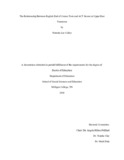| dc.description.abstract | High school students lack the reading skills needed for college and career. This has been a trend at the national level for more than a decade, and it proves to be a trend in Tennessee as well. ACT and Tennessee EOC scores indicate students are failing to reach college and career readiness benchmarks even though both tests are founded in standards with “College and Career Ready” goals. The ACT reported text complexity as the most significant indicator of college and career readiness. Other studies indicate that higher level reading skills plan a significant role in understanding texts across disciplines. Additionally, researchers suggest skills used in reading closely reflect skills used for writing. Therefore, this study examined the relationship between English 9 and 10 EOC scores with composite, reading, English, and science ACT scores. This study also examined the relationship between the English EOC writing categories with composite, reading, English, and science ACT scores. It was found that English 10 EOC scores were the strongest predictor of composite, reading, English, and science ACT scores. It was also found that the English 10 Language writing category was the strongest predictor of composite, reading, English, and science ACT scores. | en_US |


